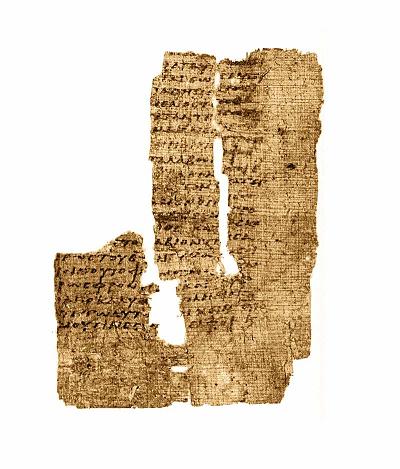| Change to Book/Chapter View |
|
|
|
Translation process is ongoing. For current status see details |
|
|

Papyrus 16 Discovered: Oxyrhynchus, Egypt Location: Cairo, Egypt: Museum of Antiquities Contents: Philippians 3:9-17, 4:2-8 Notes: This was probably part of the same manuscript as Papyrus 15.
Philippians 3 10 that I may know him, and the power of his resurrection, and the fellowship of his sufferings, becoming conformed to his death, 11 if by any means I may attain to the resurrection from the dead. 12 Not that I have already obtained, or am already made perfect; but I press on, that I may take hold of that for which also I was taken hold of by Christ Jesus. 13 Brothers,
I don’t regard myself as yet having
taken hold, but one thing I do: forgetting the things which are behind, and stretching forward to the things
which are before, 14 I press on toward the goal for the prize
of the high calling
of God in Christ Jesus. 15 Let
us therefore, as many as are perfect,
think this way. If in anything you think otherwise,
God will also reveal that to you. 16 Nevertheless, to the extent that 17 Brothers, be imitators together of me, and note those who walk this way, even as you have us for an example. [..]
Philippians 4 2 I
exhort Euodia, and I exhort Syntyche, 4 Rejoice in the Lord always! Again I will say, “Rejoice!” 5 Let your gentleness be known to all men. The Lord is at hand. 6 In nothing be anxious, but in everything, by prayer and petition with thanksgiving, let your requests be made known to God. 7 And the peace of God, which surpasses all understanding, will guard your hearts and your thoughts and body in Christ Jesus. 8 Finally, brothers, whatever things are true, whatever things are honorable, whatever things are just, whatever things are pure, whatever things are lovely, whatever things are of good report: if there is any virtue and if there is any praise, think about these things.
|
How to read these pages: • The
translation to the left is based on the World English Bible. Words in regular
black font are words in the manuscript matching the Majority Text for that
passage. • Words
in italics cannot be seen in the manuscript, since the manuscript is
fragmentary. These words are supplied for readability by the World English
Bible translation. • Words
present in the manuscript but with some letters unreadable or missing are in blue
like this: blue. One Greek word often is
translated into multiple English words, and when this occurs, all the English
words are in blue. • Words
present in the manuscript but with spelling or trivial word order differences that do not affect the
meaning are in green like this: green. • If
the manuscript is different from the Majority Text, words in the Majority
Text that are missing from the text of the manuscript are marked through in red
like this: • If the manuscript is different from the Majority Text, words in the manuscript that are not in the Majority Text are underlined in red like this: new words.If the manuscript differs from the Majority Text yet matches another well-known text, this is noted in the footnotes.
|
